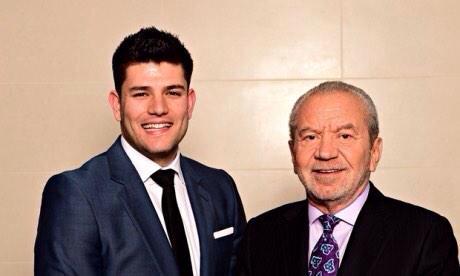Is live-tweeting ruining television?
Live-tweeting. Is it an annoying fad or the natural evolution of television watching? Reece Goodall and Hiran Adhia go head-to-head to investigate…
Live-tweeting? #ShutTheHellUp
Television has evolved into a fully interactive experience, from phone-in gameshow shoot-em-up The Golden Shot to general public interviews in pretty much every news segment ever, and for the most part, it has been a completely harmless process. However, as Twitter has become an omnipresent entity, a new interactive element has come to the forefront, and it is negative to the extreme.
‘Live-tweeting’ invites people to ‘join the conversation’ and fully interact with the programme they are watching, resulting in a live stream of texts flooding your screen. It is impossible to simply sit down and watch a show without a random stranger’s stupid thoughts forcing their way into your eye line, making inane comments about whatever you’re trying to sit through and distracting your attention to the point of insanity. It is impossible to focus fully on a show when a respected broadcaster breaks everything off to shoehorn in a hashtag, lying through their teeth as they say that they ‘want to hear your thoughts.’
It is impossible to simply sit down and watch a show without a random stranger’s stupid thoughts forcing their way into your eye line…
It is most prevalent in news and entertainment shows, and it is especially detrimental to the former. A lot of people know absolutely nothing about politics or current affairs, but we still get to see their incisive analysis of any and every event – I was watching a discussion show about Scottish independence a few months ago, and all the tweets were about politicians’ looks and trustworthiness – the juxtaposition of experts talking about a political situation with all their professional knowledge and judgement while a builder from some far-flung corner of England (whose only political awareness is that their father hated Margaret Thatcher) tells me that David Cameron looks like a sinister sausage is striking.
A lot of people know absolutely nothing about politics or current affairs, but we still get to see their incisive analysis of any and every event…
This then links into another problem – balance. TV must remain impartial and balanced, even in their live stream of tweets, so any discussion must be split into two parts to cater for all viewpoints. If a cure for cancer were found, impartiality laws would force a live tweet by a social Darwinist expressing discontent that the weak were no longer being killed off for the good of society. These opinions are used to alter yours – something that has been particularly notable in the BBC’s coverage of anything UKIP-related – the opinions are ‘balanced’ between calling UKIP racists and extreme right-wing views, subtly turning any watcher against the party.
If, sitting in your living room, random idiots strolled in and made ridiculous comments about what you were watching, you would quite rightly protest (and probably get some new locks fitted), but it has been made acceptable by Twitter’s pervasive grasp. Live-tweeting is an aberration that ruins every show it invades, and television would be a lot better off without it.
Reece Goodall
Live-tweeting is saving television
The much anticipated final of The Apprentice 2014 aired on Sunday, with a three year high of 6.2 million of us tuning in to watch Mark Wright take the prize in its tenth series. However, throughout the decade that the reality show has been on television, it has been lived and relived on Twitter, with much of the buzz for previous contestants such as Saira Khan, Katie Hopkins and Luisa Zissman carrying on way past that dreaded finger pointing at them in the boardroom.

Twitter users took to their platform following Mark Wright’s victory in The Apprentice 2014 (photo: twitter.com)
To be honest, at first I was never much of a fan of Twitter. Like Jazz Twemlow in her article on #IdioticCommentary, I can see where she is coming from when it comes to trawling through the crap. And boy is there a lot of crap in 140 character chunks. But I think that there is more to be said for live tweeting for events and especially for television.
What was once a familial activity huddled around the box set has very much turned into a private, selective process on different devices, in different rooms. We just don’t watch television together anymore. And when it comes to live television, if anything it can be a monotonously boring experience where everyone sinks into their chairs and stares at the screen with little conversation between them.
We want there to be an option for more conversation, we want the user experience to be more interactive and we have that right at our fingertips behind the bluebird symbol.
Twitter has changed things. When my Dad asks me to check the tweets on an episode to see what everyone else thought about how much of a twat that candidate was, it tells me that there is something to be had here. We want there to be an option for more conversation, we want the user experience to be more interactive and we have that right at our fingertips behind the bluebird symbol.
It isn’t perfect. We have to use our own crap filters to look through the stream, but when we do I think we can find some good stuff that keeps you entertained. When Mark Wright won the Apprentice, it was interesting to see how the next biggest SEO competitor had only just started using Twitter:
Mark Wright is a professional internet. He knows the industry backwards. Early adopter & power user. pic.twitter.com/yMIyzdyOFO
— not ALL welps (@welprich) December 21, 2014
The official account always has plenty to say to keep the momentum going:
Oh dear. #theapprentice pic.twitter.com/IwvoMlzbVf — The Apprentice (@bbcapprentice) October 14, 2014
And of course, the cringe worthy “banter” from the boss himself:
Has Bianca plan got legs …..the decision could be “tight”
— Lord Sugar (@Lord_Sugar) December 21, 2014
All in all, I don’t think live-tweeting is ruining television; rather, it is saving it. It takes you back to that nostalgic 1970s picture of your parents huddling around a television with the family for a big event, annoying and making each other laugh at the prospect of what is going on in front of them. It makes it more of a spectacle, rather than the stale entity that it is slowly turning into. Unless we start to make the experience of watching more exciting, it is going to be another form of entertainment that is shelved for more individual pursuits. Don’t see it as a nuisance, but a natural evolution. If we wait until the end like Twemlow advocates, we might just be missing the point.
Hiran Adhia


Comments